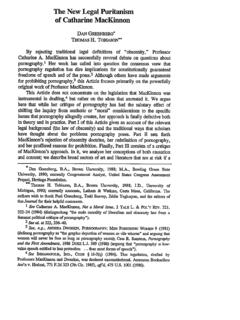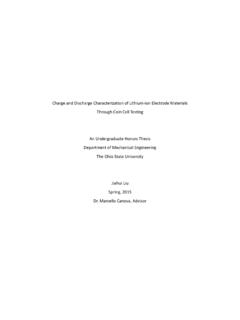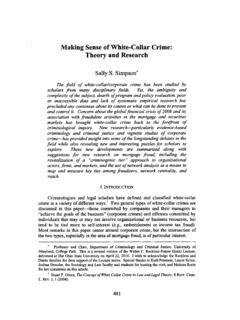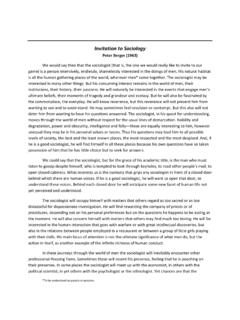Transcription of Berger, Raoul - Ohio State University
1 CritiqueA Political Scientist as Constitutional Lawyer:A Reply to Louis FisherRAOUL BERGER*"a little learning is a dangerous thing ..-Alexander PopeNoting that "Current writings by political scientists depend heavily onProfessor Raoul Berger," Louis Fisher sets out in Raoul Berger on PublicLaw,' an omnibus review of the four books I have published since 1969,2 toprove that they lack "solid scholarship," and "urge[s] political scientists toproceed with caution before adopting Berger as an authoritative andreliable Presumably he assumes that social scientists like AlpheusThomas Mason, Arthur Schlesinger, Jr.
2 , and C. Vann Woodward, andconstitutional scholars like Alexander Bickel, Willard Hurst, and PhilipKurland, with whom one or another of these books found favor,4 were ill-equipped to assay "solid scholarship." Fisher, who charges me with being"one-sided," with "unidimensional lawyer briefs,"5 who is so quick to stressthat Berger does not "mention" this or the other fact,6 makes "no mention"of such respected reviewers, or of any views opposed to his own, but relieson lesser fry whose merit is obvious-they criticized my writings. This is* , Northwestern Univ. 1935; , Harvard 1938; Charles Warren Senior Fellow inAmerican Legal History, Emeritus, Harvard 8 POL.
3 ScI. REVIEWER 173 (1978) [hereinafter Fisher].2. CONGRESS V. THE SUPREME COURT (1969) [hereinafter CONGRESS V. COURT]; IMPEACHMENT:THE CONSTITUTIONAL PROBLEMS (1973) [hereinafter IMPEACHMENT]; EXECUTIVE PRIVILEGE: ACONSTITUTIONAL MYTH (1974) [hereinafter EXECUTIVE PRIVILEGE]; GOVERNMENT BY JUDICIARY: THETRANSFORMATION OF THE FOURTEENTH AMENDMENT (1977) [hereinafter GOVERNMENT BY JUDICIARY].3. Fisher, supra note 1, at Their encomia appear on the dust jackets of my Fisher, supra note 1, at 178, Eg., "This is basic history but I find no mention of it anywhere in Berger's fourbooks.
4 Do we ignore information that becomes inconvenient and upsetting to tidy accounts?"Id. at 176-77; and see id. at 178, 180. But see note 175 Although Fisher cites profusely to my replies, it is to select "polemical" phrases, never toexamine any of my refutations on the merits. Several reviewers have commented that my critics "havegiven singularly unsatisfactory answers" to some of my questions. Kommers, Book Review, 40 REVIEWOF POLITICS 409, 413 (1978); Perry, Book Review, 78 COLUM. L. REV. 685, 694 (1978): "Regrettablyfewer constitutional scholars and theorists than one might think seem prepared to acknowledge theserious challenge Berger's argument poses.
5 " And Perry adds, "Berger effectively destroys whatevermight have remained of the notion that modern constitutional cases involving legislativereapportionment, school desegregation, criminal procedure, or first amendment issues are somehowrooted (however tenuously) in the original understanding ..of the fourteenth amendment." Id. at694, 688. Professor John Burleigh, who disagrees with my view of the Court's role, stated that my book"not only raises all the right questions, but is carefully documented and rigorously argued, at oncelearned, illuminating and challenging.
6 " Burleigh, The Supreme Court vs. the Constitution, 50 THEPUB. INTEREST 151, 152-53 (Winter 1978).OHIO State LA W JOURNALbut one illustration of Fisher's unfailing unwillingness to take account ofdiscrepant facts and opposing opinions, a prime requisite of scholarship,the absence of which casts doubt on his qualifications to pass judgment onthe scholarship of others. So packed with error is Fisher's tirade that butfor the fact, to quote him, that for political scientists "[t]he temptation isstrong to take at second-hand what they are unprepared and unwilling tostudy directly,"8 I should consider it unworthy of further remark,particularly because it is more laborious to remove than to smear THE EXECUTIVE POWERAs a prelude to his assault upon my study of executive privilege,Fisher seeks to rehabilitate an uncircumscribed Executive Power,endowed with undescribed "implied, inherent" powers, not limited by theaccompanying enumeration of granted powers.
7 To begin with hisdiscussion of the 1793 exchange between Hamilton and Madisonrespecting the Executive Power in the "Pacificus" and "Helvidius" papers,he opines that my treatmentis one-sided and idiosyncratic. [Berger] relies on Madison's writings as"Helvidius," which conform to Berger's scenario, while discountingHamilton's essays as "Pacificus," which do not. He tries to discredit the"Pacificus" essays by quoting John Quincy Adams' remark in 1836 thatMadison "scrutinized the doctrines of Pacificus with an acuteness of intellectnever perhaps surpassed." A convenient quote, no doubt, but it is thinanalysis to dismiss Hamilton by quoting someone is a blatant misrepresentation.
8 In fact, I had first demonstrated thatHamilton had executed a volteface, repudiating assurances he had madein The Federalist to procure adoption of the Adoption wastouch and go and Hamilton, aware of the "aversion of the people tomonarchy," and their readiness to regard "the intended President ..asthe full grown progeny of that detested parent," had soothingly down-graded one after another of the enumerated Executive Powers. Forexample, the "Commander-in-Chief was merely to be the 'first General' ";he assured the Ratifiers that nothing was "to be feared" from an Executive"with the confined authorities of a President.
9 "'1 Now as "Pacificus" heturned his back on the representations upon which the Ratifiers had relied,as Madison pointed out in "Helvetius," and plumped for a plenaryexecutive power, brushing aside the enumeration of specific presidentialpowers as not "derogating from the more comprehensive grant of the8. Fisher, supra note 1, at Id. at 178 (footnotes omitted).10. ExECUTIVE PRIVILEGE, supra note 2, at shall cite to my books forcitationsto the sources to show that those materials were spread before Fisher, to direct attention toconfirmatory materials, and to conserve Id.
10 At 53.[Vol. 41:147 REPLY TO LOUIS FISHERE xecutive power."'12 So I did not "dismiss Hamilton [merely] by quotingfrom someone else."Is Adams' testimony of less weight than Louis Fisher's views? Adams'evaluation, it may be added, was later shared by Edward Corwin, whoremarked on the "essential truth of 'Helvidius' contention that 'Pacificus'reading of the executive power clause contravened, certainly in effect, theexpress intention of the Constitution that the war-declaring pow-er ..should lodge with the legislative authority,"3 as Hamilton himselfhad said in the Convention.]


















